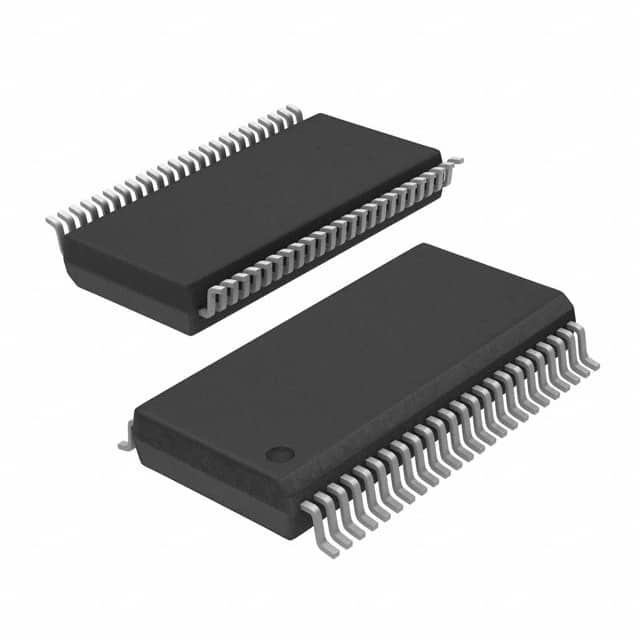Lihat spesifikasi untuk detail produk.

CY74FCT16244ATPVC
Basic Information Overview
- Category: Integrated Circuit (IC)
- Use: Buffer/Line Driver
- Characteristics: High-speed, low-power, 16-bit bidirectional buffer
- Package: TSSOP (Thin Shrink Small Outline Package)
- Essence: Provides voltage level translation and signal buffering capabilities
- Packaging/Quantity: Tape and Reel, 2500 units per reel
Specifications
- Number of Bits: 16
- Logic Family: FCT
- Supply Voltage: 4.5V to 5.5V
- Input/Output Type: Tri-State
- Output Drive Capability: ±24mA
- Propagation Delay Time: 3.5ns (typical)
- Operating Temperature Range: -40°C to +85°C
Detailed Pin Configuration
The CY74FCT16244ATPVC has a total of 48 pins, which are arranged as follows:
┌───┬───┐
OE1 ──┤1 └─ 48├ VCC
A1 ──┤2 47├ GND
B1 ──┤3 46├ B2
A2 ──┤4 45├ A2
B2 ──┤5 44├ B1
A3 ──┤6 43├ A1
B3 ──┤7 42├ OE2
A4 ──┤8 41├ Y1
B4 ──┤9 40├ A4
A5 ──┤10 39├ Y2
B5 ──┤11 38├ B5
A6 ──┤12 37├ A5
B6 ──┤13 36├ B4
A7 ──┤14 35├ A3
B7 ──┤15 34├ B3
A8 ──┤16 33├ A2
B8 ──┤17 32├ B2
GND ──┤18 31├ A1
Y8 ──┤19 30├ B1
A9 ──┤20 29├ OE1
Y7 ──┤21 28├ VCC
B9 ──┤22 27├ OE2
Y6 ──┤23 26├ Y1
A10 ──┤24 25├ GND
└───┴───┘
Functional Features
- Bidirectional Buffer: Allows data to be transmitted in both directions.
- Tri-State Outputs: Enables the outputs to be disabled, effectively disconnecting them from the bus.
- Voltage Level Translation: Facilitates communication between devices operating at different voltage levels.
- High-Speed Operation: Provides fast signal propagation and response times.
- Low Power Consumption: Optimized for low power applications.
Advantages and Disadvantages
Advantages: - Versatile buffer with bidirectional capability. - Supports voltage level translation. - High-speed operation for efficient data transfer. - Low power consumption for energy-efficient applications.
Disadvantages: - Limited number of bits (16) may not be suitable for larger data buses. - Requires careful consideration of input and output voltage levels to prevent signal distortion.
Working Principles
The CY74FCT16244ATPVC is a 16-bit bidirectional buffer that allows data transmission in both directions. It operates by receiving input signals on the A-side and transmitting them to the B-side, or vice versa. The tri-state outputs enable the buffer to be disabled, effectively disconnecting it from the bus. This feature prevents contention issues when multiple devices attempt to drive the same bus simultaneously. The buffer also provides voltage level translation, allowing communication between devices operating at different voltage levels.
Detailed Application Field Plans
The CY74FCT16244ATPVC is commonly used in various applications, including: 1. Microprocessor Systems: Facilitates communication between microprocessors and peripheral devices. 2. Data Communication Networks: Enables signal buffering and voltage level translation in network interfaces. 3. Industrial Automation: Supports data transmission between control systems and sensors/actu
Sebutkan 10 pertanyaan dan jawaban umum terkait penerapan CY74FCT16244ATPVC dalam solusi teknis
Sure! Here are 10 common questions and answers related to the application of CY74FCT16244ATPVC:
Question: What is CY74FCT16244ATPVC?
- Answer: CY74FCT16244ATPVC is a specific type of integrated circuit (IC) that functions as a 16-bit buffer/line driver with 3-state outputs.Question: What is the purpose of using CY74FCT16244ATPVC in technical solutions?
- Answer: CY74FCT16244ATPVC is commonly used to provide buffering and signal amplification capabilities in various digital systems, such as data communication networks, computer systems, and industrial automation.Question: What voltage levels does CY74FCT16244ATPVC support?
- Answer: CY74FCT16244ATPVC supports a wide range of voltage levels, typically ranging from 4.5V to 5.5V.Question: How many channels or bits can CY74FCT16244ATPVC handle?
- Answer: CY74FCT16244ATPVC has 16 channels or bits, allowing it to handle 16 lines of input/output signals.Question: Can CY74FCT16244ATPVC operate at high speeds?
- Answer: Yes, CY74FCT16244ATPVC is designed to operate at high-speed performance, making it suitable for applications that require fast data transfer rates.Question: Does CY74FCT16244ATPVC have built-in protection features?
- Answer: Yes, CY74FCT16244ATPVC incorporates various protection features, such as ESD (electrostatic discharge) protection, to ensure reliable operation and prevent damage from external electrical events.Question: Can CY74FCT16244ATPVC be used in bidirectional data transmission?
- Answer: Yes, CY74FCT16244ATPVC supports bidirectional data flow, allowing it to handle both input and output signals.Question: What is the maximum current that CY74FCT16244ATPVC can drive?
- Answer: CY74FCT16244ATPVC has a maximum output current of around 64mA, which enables it to drive various loads efficiently.Question: Is CY74FCT16244ATPVC compatible with other standard logic families?
- Answer: Yes, CY74FCT16244ATPVC is designed to be compatible with a wide range of standard logic families, such as TTL (Transistor-Transistor Logic) and CMOS (Complementary Metal-Oxide-Semiconductor).Question: Are there any specific application examples where CY74FCT16244ATPVC is commonly used?
- Answer: Yes, some common application examples include bus interfacing, memory address decoding, clock distribution, and general-purpose digital signal buffering.
Please note that these questions and answers are general in nature and may vary depending on specific use cases and requirements.

